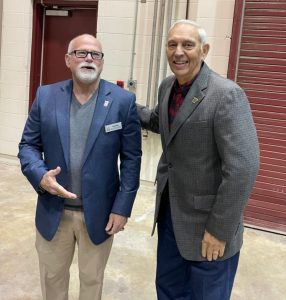Williams’s Legacy Will Impact Generations of Construction Management Students at UA Little Rock

The Central Arkansas construction industry owes a lot to Howard Williams, the former truck driver who headed the Arkansas Contractors Licensing Board for decades.
Among the many contributions he’s known for is his unwavering support for the education and advancement of young construction professionals in Arkansas.
“I know for a fact that the UA Little Rock construction management program would not exist without Howard’s influence,” said Mike Tramel, a professor of construction management and former chair at UA Little Rock. “Howard loved the program and the students. He was a very student-oriented person.”
One of William’s enduring legacies will be building the foundations of the Bachelor of Science in Construction Management degree program housed in the Department of Construction Management and Civil and Construction Engineering at UA Little Rock. Hundreds of students have benefited from the strong education they’ve received in the nearly 30 years since the program began and have gone on to have successful careers in the industry.
While serving as administrator of the Arkansas Contractors Licensing Board, Williams recognized the industry need for a construction management program in Central Arkansas. He was instrumental in the development of the program, and his efforts led to much fundraising in support of the program and student scholarships over the years. Early investments from the Arkansas Contractors Licensing Board included a $25,000 grant to purchase construction educational materials and licenses in Ottenheimer Library and a $100,000 grant for startup costs of the new bachelor’s degree program.
Williams presented part of the grant to then Chancellor Charles Hathaway, then Dean Charles Stevens, and Jim May, former chairman of the Construction Management Advisory Program, on April 29, 1994. The grant was used to finance a new student construction project and lecture area, renovate five rooms in the engineering building, and purchase 10 fully equipped computer workstations.
In a 1994 edition of the Arkansas AGC News, then Chancellor Hathaway said that the “commitment of the Advisory Council and members of the construction industry made this a very smooth process and showed the need for the program.”
A unique requirement of the new bachelor’s degree that remains to this day is a graduation requirement of 800 hours of cooperative education with a construction company. The work requirement allows students to gain tremendous on-the-job experience prior to graduation while reinforcing what they have learned in the classroom. This has proven to be a tremendous asset as students in the program have a 100 percent employment rate upon graduation, proving that UA Little Rock’s construction management graduates are highly sought after by the construction industry.
“The one thing that I wanted in the curriculum more than anything was the 800 hours of fieldwork,” Williams said. “I wanted young men and women to know what they were headed into. I think that has proven to be a real asset.”
A draw toward construction
When Williams was just 16 years old, he worked part-time for his father. They were working at Poteet Trucklines just outside Conway when the manager asked Williams’ father if he knew anyone who could drive a truck, and his father volunteered Williams. This was the beginning of his 25-year career in trucking.

“I got out of the hole, washed my boots off, and put them in the back of the truck, and I never put them back on,” Williams recalled. “I started my career in trucking when I was 16 years old,” Williams said. “At the age of 41, I had the opportunity to make a career change. I went to work for the state as administrator of the Arkansas Contractors Licensing Board. That job involved the licensure of commercial contractors at the time. It really was an opportunity for me. About the only direction we had to go was up, so it was a nice challenge for me.”
Established in 1939, the Arkansas Contractors Licensing Board was created to preserve public health and safety in the Arkansas construction industry. At the time that he was hired, Williams remembers that there wasn’t much enforcement of the licensure of all contractors and subcontractors building in the state of Arkansas. It was normally a voluntary process, but Williams was tasked with developing an enforcement and compliance program.
“I never prepared a piece of legislation that I didn’t take to the industry first,” Williams said. “When I went to the Capitol, I always expected to have support and did. The Contractors Licensing Board was very good to me. They had good board members who were very successful contractors and were very knowledgeable.”
He was responsible for such innovations like getting the licensing board staff their first cell phones in the field.
“I went before the state legislature to ask for cell phones,” he said. “The Licensing Board was the first to have them. They needed them in the field to make updates, but they were expensive. I explained that my people needed them because they were always calling in updates from phone booths. At the time, the doors don’t close, and it’s hard to hear people on them. I would sometimes stop at a hotel lobby when I was out in the field just to have a good place to make phone calls.”
It was in 1992 when May and Jack Kinnaman, founder of Kinco Constructors Inc., began the conversation with Williams about the importance of starting a Construction Management program at UA Little Rock, and the rest is history.
When Tramel came on board as chair of the department at UA Little Rock in 1997, Williams was instrumental in his decision.
“This was the only university I went to where the advisory board interviewed me,” Tramel said. “I had opportunities with other universities, but I came here because of industry participation. Howard is a phenomenal guy, and he’s the reason I’m here. Howard was very influential in getting things done.”
It runs in the family
William’s legacy also extends to construction management education at the high school level. His daughter, Dr. Cathy Riggins, assistant superintendent of Vilonia Public Schools, leads Vilonia Pathways Academy. The first-of-its-kind charter school in Arkansas has a concurrent program in which students can gain an associate degree in construction science through UA Little Rock while still in high school. After graduation, students can choose to enter the construction industry right away or continue their college education to earn a bachelor’s degree at UA Little Rock.
“This high school program that Cathy has developed with industry partners is a landmark of education,” Williams said. “It’s a tremendous program and obviously the industry supports it. It’s been very satisfying to see the success. There are about 105 students, and that’s a tremendous testament to the need of the school.”
Riggins said her father’s experience with the construction industry and helping to build the Construction Management program at UA Little Rock has been invaluable to her own experience as the lead architect and project manager of Vilonia Pathways Academy.
“My dad’s influence has meant a lot to me,” Riggins said. “He has always been willing to step out of the box to implement a plan. This is what happened with the Construction Management program. With education, I have seen a need to offer a nontraditional path. Knowing what I did from the CM program and my dad’s job, I knew jobs were needed in the construction industry. Over 25 years ago, dad worked with UALR to complete a survey concerning workforce needs in the construction industry. The results indicated that unless there was a systematic approach to bring students to the field, there would be a shortage of industry workers in the next 25 years. These results have proven to be true.”
When planning the Construction Management program at UA Little Rock, Williams went directly to the people who were hiring and got advice on the skills and education industry partners thought were needed for their future workers. It’s a useful strategy that Riggins repeated while developing the curriculum for Vilonia Pathways Academy.
“Dad has always said that the Construction Management program at UA Little Rock is industry driven and that’s why it works,” Riggins said. “For the first time, we went back to the people who were hiring and asked them what our students needed to know. This is what Dad did 30 years ago and what I did in recent years. I hope it will be said that I was a servant to students, just like my dad. We are having students that are leaving us with a future, not just a job but a career. This is a place where all students can have the American dream.”
Williams has always made time to serve his community. In his early adult years, he spent nearly 20 years on the Vilonia School Board. Ever since retiring in 2008, Williams has continued to stay busy. He has served more than 30 years on the Vilonia Waterworks Association, still spending his days as a liaison to a wholesale water board Vilonia is a part of.
When asked about what students today need to have a successful career in the construction industry, Williams said it’s all about desire.
“They have to have a desire to succeed and a vision of where they want to go and what they want to achieve,” Williams said. “Until the Lord changed my vision, I was a truck driver and a good one. I was accident free and served my company well. Now, I have tried to give back to my community. Our Construction Management program is second to none in reality because the industry supports it. They are the drivers of the program.”
